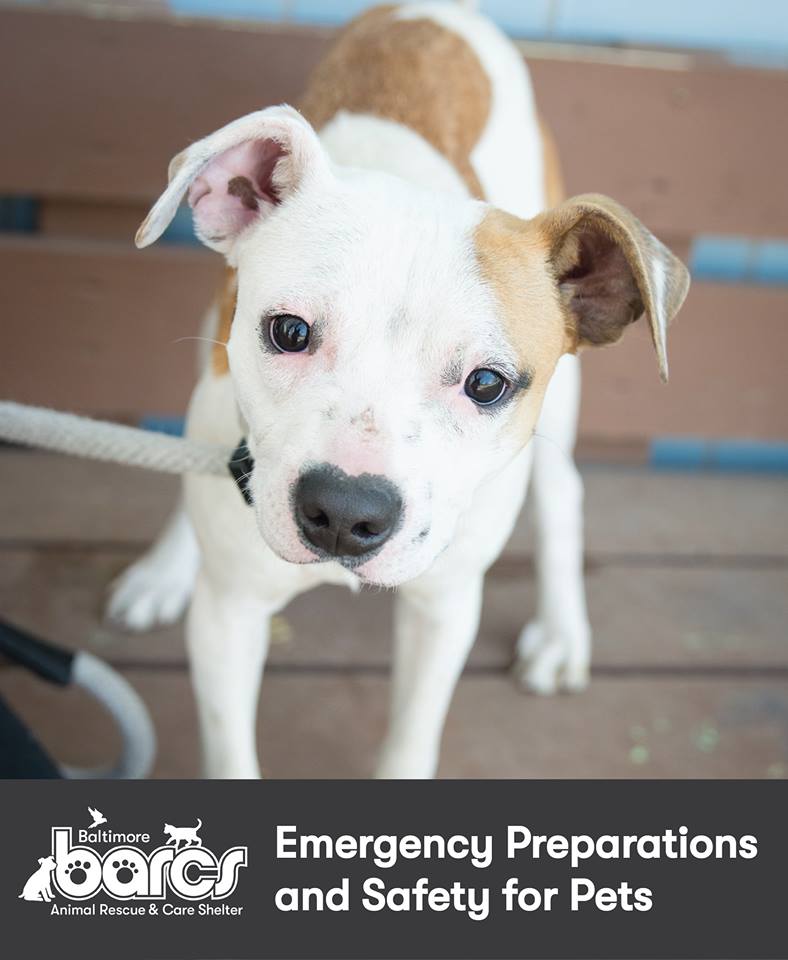
Emergency Preparations for Pets
The first step in keeping pets safe in the wake of an emergency or natural disaster is to simply have a plan. For those in the potential path of Hurricane Florence, now is the time to sit down with your family/household and make a list of the items you need to care for your animals.
Build a Kit: Include basic survival items and items to keep your pet happy and comfortable.
• Food. At least a three-day supply in an airtight, waterproof container.
• Water. At least three days of water specifically for your pets.
• Medicines and medical records.
• Microchip. When was the last time you updated or checked on your pet’s microchip information? Microchips are the best chance of a lost pet being reunited with their family.
• Collar or harness with ID tag, rabies tag and a leash.
• Important documents. Registration information, adoption papers and vaccination documents.
• First aid kit. Cotton bandage rolls, bandage tape and scissors; antibiotic ointment; latex gloves, isopropyl alcohol and saline solution. Including a pet first aid reference book is a good idea too.
• Crate or pet carrier. Have a sturdy, safe crate or carrier in case you need to evacuate. The carrier should be large enough for your pet to stand, turn around and lie down.
• Transportation plan. If you need to leave your area with your pets in the car, consider the safest option for your pets. Does your cat need extra space from your dog? Do you have multiple animals with complicated relationships with each other? Brainstorm vehicle configurations that will lesson stress for both you and your animals.
• Sanitation. Pet litter and litter box if appropriate, newspapers, paper towels, plastic trash bags and pet-safe household cleaner.
• A picture of you and your pet together. If you become separated, a picture of you and your pet together will help you document ownership and allow others to assist you. Add species, breed, age, sex, color and distinguishing characteristics.
• Familiar items. Familiar items, such as treats, toys and bedding can help reduce stress for your pet.
Information Gathering and Resources
• Have your pet microchipped and make sure that you not only keep your address and phone number up-to-date, but that you also include contact info for an emergency contact outside of your immediate area. We cannot stress this enough! If you do not have a regular family veterinarian, please refer to our Community Resource Guide for options in the Greater Baltimore Area.
• Create a buddy system with your neighbors in case you’re not home or get stranded and are unable to return home. Ask a trusted neighbor to check on your animals.
• In the case of an evacuation, find pet-friendly hotels along your route and keep a list in your pet’s emergency kit.
• Consider an out-of-town friend or relative. Start phoning these contacts now to be sure your pets are welcome to their home. Think of what you need to bring with you to be sure your pet is a well-behaved or well-managed guest. (Kongs, peanut butter, high-value treats and toys, etc.)
• Locate a veterinarian or animal hospital in the area where you may be seeking temporary shelter, in case your pet needs medical care. Add the contact information to your emergency kit.
• Call your local emergency management office, animal shelter or animal control office to get advice and information.
• If you are unable to return to your home right away, you may need to board your pet. Find out where pet boarding facilities are located. Most boarding kennels, veterinarians and animal shelters will need your pet's medical records to make sure all vaccinations are current.



